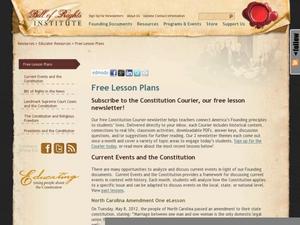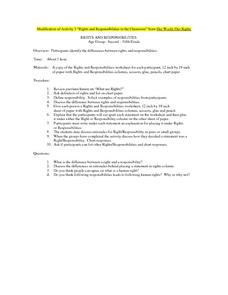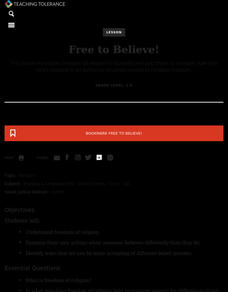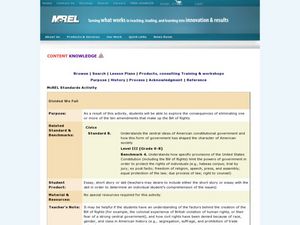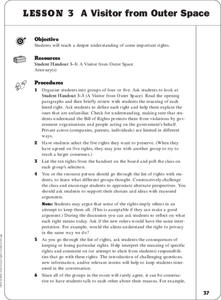Curated OER
The First Amendment: Freedom of Expression
Learners explore First Amendment rights. In this U.S. Constitution lesson plan, students examine the freedom of expression as they view a PowerPoint presentation and listen to the lecture that accompanies it.
Curated OER
Celebrate Constitution Day
Students examine the constitutions structure, content, and underlying philosophy by skimming through as a class then breaking into groups to focus on separate articles. To reinforce learning they individually analyze constitutional...
Curated OER
The Preamble to the U. S. Constitution
Fifth graders explain the purpose of the government by examining the Preamble to the Constitution. They identify ways in which the government is preserving those rights today. They discover one of the fundamental principles of...
Curated OER
Why We Chose Our Constitution
Students examine the American plan for government. In this American government lesson, students examine selected Internet websites regarding the Magna Carta, the Articles of Confederation, and the Constitution.
Curated OER
The U.S. Constitution Power Grab Game
Students study the powers and limitations of the three branches of the American government. They explain how the system of "checks and balances" protects the individual citizens. They explain how the amendments to the Constitution...
Curated OER
The U.S. Constitution
Students explain the differences between the three branches of government. Using the structure of a democracy, they listen to text about the United States Constitution. They discover how their government affects their lives in negative...
Curated OER
US Government: The Constitution
Students explore the branches of government. In this U. S. Constitution lesson, students examine the system of checks and balances in the U.S. plan of government as they read the document and define vocabulary words.
Curated OER
Constitutional Resources
Students survey information on the Constitution. In these history lessons, students explore the founding principle's of the United States.
Curated OER
Rights and Responsibilities
Students focus on the rights and responsibilities of being an American citizen as they develop a T-chart and discuss the topic.
Curated OER
From Tinker to Fraser: Freedom of Speech in Public Schools
The Tinker and Fraser cases were taken the Supreme Court on the basis of the 1st Amendment right to Freedom of Speech. Learners discuss each case, the First AMendment, complete handouts, and conduct a role play activity. Handouts are...
Curated OER
Hiibel vs. Sixth Judicial District Court of Nevada
Did Hiibel's arrest and conviction for not telling a police officer his name violate his rights? Have your learners read a short description of the case and answer the comprehension questions that follow. Resource links and extension...
Curated OER
Symbolic Speech
Ninth graders consider the right of freedom of speech as it is outlined in the U.S. Constitution. They receive background information for the US Supreme Court, the Bill of Rights, and free speech. They discuss a series of actual cases...
Teaching Tolerance
Free to Believe!
The United States: One nation with countless religions. An interesting lesson focuses on the freedom of religion protected under the First Amendment. Academics learn why it is important to protect all religions, why there is a separation...
C-SPAN
Presidential Birth Requirement
Every president of the United States must be a natural-born citizen, but the definition of natural-born is not as straightforward as it seems. Secondary scholars examine two points of view surrounding the constitutional requirement and...
Carolina K-12
Marsh v. Chambers and the Establishment Clause
1983 Supreme Court case Marsh v. Chambers, which centers on whether opening a legislative session with a prayer violates the Establishment Clause in the First Amendment to the US Constitution, is the focus of a series of discussions and...
Curated OER
Getting to Know the Founding Fathers
Learners focus on the values of moderation and self-discipline as exemplified by the U.S. Constitution and the Founding Fathers. Students participate in dialogues and role-plays.
Curated OER
A Right to Bear Arms - One Patriot's View
Students research Samuel Adams' role in the crafting of the Second Amendment. They consider how Adams' views evolved with time and write a one-page response linking their research to current events.
Curated OER
Presenting Constitutional Issues in a Non-adversarial Mode
Students study the Fourth, Fifth, Sixth, Eighth Amendments to the US Constitution. They apply different points of view to their research and present their finding to the class.
Curated OER
Presidents and the Constitution: Lincoln and the Emancipation Proclamation
Students consider the impact of Lincoln's Emancipation Proclamation In this U.S. Constitution lesson, students read a narrative regarding the move by Lincoln to officially end slavery. Students take notes on the case and respond to...
Curated OER
Divided We Fall
Students investigate the consequences of eliminating one or more of the amendments to the Bill of Rights.
Curated OER
A Visitor from Outer Space
Students read the handout, "A Visitor from Outer Space" and discuss the bill of rights. They complete the Bill of Right checklist individually or in small groups then complete a poll ranking each freedom. Students write reasoning behind...
Curated OER
Lesson 3: A Visitor From Outer Space
Students review provisions of Bill of Rights and First Amendment, choose five rights they would like to preserve, support their choices and ideas with reasoned arguments, and discuss consequences of keeping or losing particular rights.
Curated OER
Planet X
Students work together to create their own bill of rights. They pretend they are the founder of a new colony and need rules. They must negotiate with one another as well.
University of Arkansas
Assessment and Discussion
"Without concerned citizen action to uphold them (human rights) close to home; we shall look in vain for progress in the larger world. . ." Eleanor Roosevelt's comment is used to set the stage for the conclusion of a five-lesson unit...









